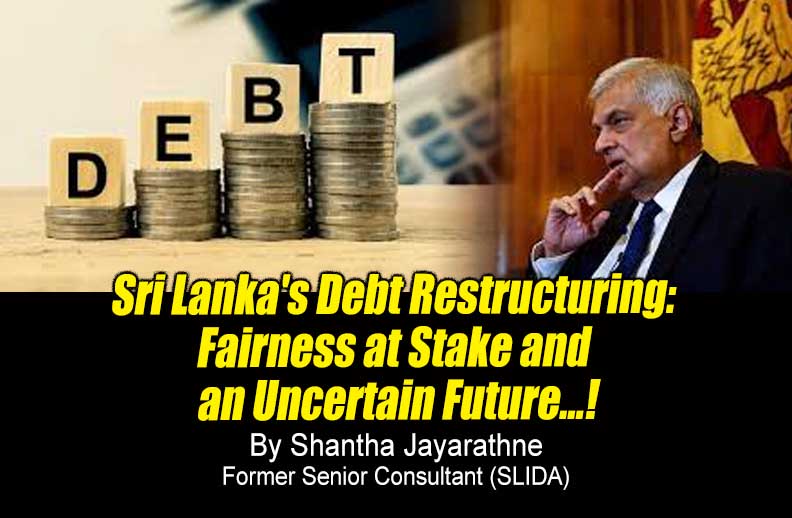-By Shantha Jayarathne -Former Senior Consultant(SLIDA)

(Lanka-e-News -03.July.2023, 10.00 PM) In a dramatic turn of events, Sri Lanka's Central Bank and Finance Ministry have finally unveiled their long-awaited plan for domestic debt restructuring-vital step in achieving debt sustainability as demanded by the IMF. However, as Governor Nandalal Weerasinghe reluctantly announced the move, it became apparent that the burden of this restructuring would not be shared equally. The preferential treatment given to foreign investors and a few selected domestic creditors raises questions about fairness and the potential repercussions for the economy.
Governor Weerasinghe, who had staunchly opposed domestic debt restructuring in the past, now argued for locals to share the burden, citing the 30 percent reduction in the value of sovereign bonds demanded from foreign creditors. While commercial banks have been exempted from the restructuring, reducing concerns of a bank run, this selective approach violates the principle of treating all creditors equally.
Under the Domestic Debt Optimization (DDO) plan, bonds held by pension funds, including the significant Employees Provident Fund, will face extended tenure and reduced coupon interest rates. Meanwhile, bonds held by banks, a few primary dealers and selected high net worth investors remain untouched, creating an imbalance in the impact on different bondholders.
The restructuring primarily targets dollar-denominated SLDBs, leaving holders facing a potential 30 percent reduction in value. The remaining amount will be locked in for six years, earning a meager 4.0 percent interest. Alternatively, bondholders may exchange their dollar bonds for depreciated rupees, with a slightly higher interest rate than the central bank's policy rate, but with the funds locked in for a decade.
Governor Weerasinghe argues that these measures will improve the balance sheets of commercial banks, as they have already been asked to account for a 35 percent reduction in the value of SLDBs. While this may provide some relief, concerns linger about the overall impact on the banking sector and the potential consequences for investors in the stock exchange.
The political consequences of the debt restructuring are expected to hit the Employees Provident Fund (EPF) the hardest. While the Central Bank guarantees that the EPF and other pension funds will receive 12 percent interest on their government bonds until 2025, and thereafter 09 percent, doubts arise about the value of assurances from a government already in default. However, currently the weighted average for investment funds is 13.5%, and with the proposed step down approach, the EPF would lose over three trillion of rupees by the end of the extended term of maturity.
The burden of the restructuring disproportionately affects low-income earners, as the EPF, by law, primarily invests in government securities. The government's previous questionable investments and involvement in scams further exacerbate the situation, as taxpayers are once again burdened with the task of revitalizing a bankrupt nation.
While the government has a parliamentary majority to push through the debt restructuring, legal challenges from EPF members and SLDB holders may arise. However, such proceedings could only prolong the pain.
Given the projected shortfall in state revenue and the narrow scope of the proposed DDO strategy, doubts persist about whether it provides enough flexibility for the government to regain control of the fragile budgetary situation. The burden ultimately falls on general taxpayers, particularly members of pension funds, further impacting low-income earners.
As Sri Lanka navigates its precarious budgetary situation and the looming specter of financial collapse, the government's controversial debt restructuring plan raises serious concerns. With an unequal distribution of the burden and a lack of transparency, the hardships faced by vulnerable sectors of society could worsen. Urgent action is needed to pursue a fair and sustainable path forward, ensuring a brighter future for all citizens and the economy as a whole.
Former Senior Consultant
Sri Lanka Institute of Development Administration
---------------------------
by (2023-07-03 16:49:50)
Leave a Reply